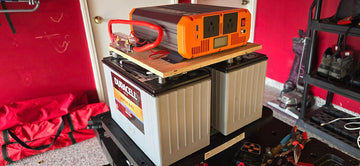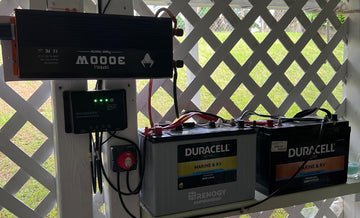In the United States, household energy consumption has been a focal point for both environmental sustainability and cost-efficiency. Understanding the current trends and dynamics of energy usage within American homes is crucial for shaping future policies and encouraging a shift towards cleaner and more efficient energy practices. This paper provides an in-depth look at the current state of residential energy consumption in the United States, focusing on key aspects such as energy sources, efficiency measures, solar energy adoption, technological advances, government incentives, and general trends in sustainable energy solutions.
The primary energy sources for US households include electricity, natural gas, oil, and renewable energy. Electricity is used to power appliances and lighting, natural gas is commonly used for heating and cooking, and oil is used primarily for heating. With the popularity of renewable energy sources such as solar energy, more and more households are considering clean energy sources to reduce their dependence on traditional energy sources, drive the energy transition, and improve energy efficiency.
How many homes in the US have solar panels
With more than 40,000,000 homes in the U.S. equipped with rooftop solar panels as of February 2024, the landscape of U.S. energy consumption is undergoing a major shift. Solar energy use varies from state to state, and they all use solar energy to varying degrees, reflecting a common national quest for a renewable energy transition.

At 1.8 million units, California's installed solar capacity is almost ten times that of Arizona, the state with the second largest installed solar capacity. This huge gap underlines California's position and huge potential in solar energy, thanks to once-supportive policies, significant investment, and an ideal climate.
Arizona is the state with the second highest number of solar homes, with 290,000 solar homes using its abundant sunlight to efficiently harness solar energy. The state's commitment to expanding its solar capacity and growing number of installations has made it a national leader in solar energy production. Arizona's success story proves that solar is viable in sunny regions.
New York State is following suit, setting an example for the northeastern United States with its aggressive renewable energy goals and strong solar incentive program. Despite a more diverse climate, New York State's efforts to increase solar adoption demonstrate the broad applicability of solar solutions across geographic and climatic conditions.
Florida, the Sunshine State, is naturally one of the states with the highest solar energy usage. Thanks to a favorable climate, an evolving policy framework, and increasing public and private investment in solar technology, the state's vast solar potential is increasingly being tapped.
New Jersey may surprise some, but its status as the top state for solar power generation is well deserved. With one of the most aggressive Solar Renewable Energy Certificate (SREC) markets and supportive state policies, New Jersey has made significant strides in solar installations that benefit both the residential and commercial sectors.
Massachusetts stands out for its innovative policies and incentive programs that encourage solar adoption. The state's commitment to renewable energy has made it a leader in solar installations, demonstrating that even states with less-than-ideal solar conditions can make significant contributions to the solar sector.
Colorado's natural beauty complements its achievements in solar energy. With a strong environmental conscience and plenty of sunshine, Colorado has a strong focus on solar energy and is investing heavily in solar installations across the state.
Nevada's vast deserts are now not only blessed with natural beauty but also home to thriving solar projects. The state's commitment to renewable energy is reflected in its rapid solar growth, thanks to utility-scale projects and residential installations.
Maryland's strategic initiatives to promote solar energy have made it a leader on the East Coast. The state's Renewable Portfolio Standard (RPS) and tax incentives have spurred rapid growth in solar installations, making solar energy increasingly common in Maryland.
Finally, Hawaii's unique island environment and high electricity costs make it a natural alternative to solar. The state of Hawaii has aggressively pursued the use of solar energy and has one of the highest rates of solar installations per capita in the country. Hawaii's success highlights the critical role of solar energy in achieving energy independence and sustainability.
In the United States, states such as Utah, Texas, Pennsylvania, Illinois, New Mexico, Virginia, North Carolina, Oregon, and Washington are heavily involved in solar energy, with each state demonstrating unique strengths and initiatives.
Utah and Texas are sunny and are expanding solar through residential and utility-scale projects. States such as Pennsylvania and Illinois are using supportive policies to expand solar installations with a focus on diversifying their energy mix.
New Mexico and Virginia are actively pursuing solar projects supported by incentives, highlighting the potential of the southwest and southeast United States.
North Carolina stands out as a leader in the region due to its significant investment in solar farms. Meanwhile, Oregon and Washington are addressing the climate challenge of insufficient sunshine through innovative technologies and solar efficiency projects.
Key uses for residential solar
Residential solar systems come in all shapes and sizes, and the variety of ways in which solar energy can be used offers residents a wide range of innovative applications. From electricity generation to hot water, heating, and air conditioning. Solar energy is also used for interior lighting, electric vehicle charging, and energy storage, providing homes with an environmentally friendly, cost-effective, and sustainable energy solution. By using solar energy systems, residents can not only reduce their energy costs but also reduce their reliance on the grid, cut their carbon emissions, and achieve a green and sustainable lifestyle.
Finally, the various uses of residential solar can be divided into four categories:
- Off-grid - completely dependent on solar energy and not on the grid
- Hybrid - partially dependent on solar, but still connected to the grid
- Backup - storing power for emergencies
- Portable - versatile systems that can be easily transported for recreational and other uses
Off-grid
Off-grid systems are completely self-sufficient, relying on large numbers of solar panels and extensive battery storage. While more expensive, off-grid systems can eliminate running costs forever and can be used anywhere, on or off the grid, as long as there is enough sunlight to meet your energy needs.
Motivation for off-grid users:
Energy independence: For many people, not being dependent on the grid for electricity is very attractive. For some, it is an option, and for those living in remote areas, it is a necessity.
Cost savings: the initial price may be high, but off-grid systems inevitably pay for themselves over time and continue to save money by not paying a watt for electricity.
Environmental benefits: Who can say no to a clean, renewable energy source that produces no emissions or pollution?
Backup power: Technically, if it's always there, it's not a backup power source, but off-grid users will never have to worry about power cuts again because they'll always have power stored in their battery packs.
🔧: Design an off-grid solar system yourself
Hybrids
Hybrid or grid-tied systems combine solar power with grid electricity to provide the best of both worlds.
Hybrid systems do not require battery banks because the grid can provide power when the solar panels are not generating enough electricity (for example, at night). When the solar panels are generating power, this power is used to meet the home's energy needs; excess power is sent back to the grid to offset the power received from the grid.
If there is a battery bank, the power will go there first, and when the batteries are fully charged, the grid will take the excess. If there is a blackout, the batteries kick in to keep the lights on and the food cold.
Motivations for hybrid users:
Energy independence: Like off-grid solar systems, hybrid systems can be grid independent, but not completely.
Cost savings: The most common reason for installing a hybrid system is to reduce your electricity bill, which can be eliminated if your system can generate enough excess power to offset your electricity consumption when there is no sunlight. If your utility company offers daily savings, using battery power when electricity rates are low is another way to reduce costs.
Backup power
If your hybrid solar system includes battery storage, you'll have backup power in the event of a power outage or other emergency.
Environmental benefits: You may be tired of hearing this, but hybrid solar power systems are a clean, renewable energy source: no emissions, no pollution.
Grid stability: Although most people may not think about it, helping to stabilize the grid is a benefit of hybrid systems. Any excess solar power that is fed back into the grid helps to ease the strain of peak demand.
Flexibility: Hybrid solar power systems allow you to choose how much power you want to generate based on the size of your array, whether and how much you want to store in batteries, and when you want to draw power from your solar system, depending on your needs or budget.
We are all familiar with the occasional blackout, but if recent history is any indication, we need to be prepared for more frequent and more severe outages. There are several factors contributing to this, including increased demand for aging systems and climate change.
Solar backup systems have many advantages over traditional methods of coping with power outages, which involve using petrol generators or waiting for power with candles and torches. Petrol generators are dirty, smelly, noisy, unreliable, and require constant replenishment of more expensive fuel. A solar generator has none of these problems and you can use it in your home without fear of dying from carbon monoxide poisoning.
Motivations for backup users:
Safety: Backup solar power can keep your essential appliances and equipment running indefinitely, requiring only a few hours of sunlight to charge the solar generator's batteries.
Peace of mind: With the protection of a reliable, easy-to-use solar system, you never have to worry about power cuts.
Flexibility: At the heart of a solar backup system is a portable solar generator, so you can easily move it wherever you need power: connect it to a power tool such as a lawnmower, leaf blower, or chainsaw, take it camping, use it in the cabin or take it on a long road trip just in case.
Portable
The portability of a solar generator, combined with easy-to-transport, foldable solar panels, makes it very versatile in the way it can be used. Many people buy portable solar systems specifically for caravanning, camping, or a variety of ingenious uses.
Motivations for portable users:
Independence: Having a reliable power source that you can take anywhere opens up a lot of possibilities. Many people use it in their caravans so they can stop and set up base camp almost anywhere.
Comfort: Even the most hardened city dweller is willing to spend a night or two camping in the great outdoors if you can promise them the comfort that comes with some power.
Flexibility: You don't have to choose just one reason to have a portable solar system, its flexibility means you can use it anywhere, anytime, away from home. You can even keep it in your home at all times as a backup power source in the event of a power outage.
Today's solar technology
Advances in solar technology have fuelled the massive development of residential solar power systems as people seek cleaner sources of energy. The three main components of these systems - solar panels, batteries, and inverters - are all undergoing developments that make powering your home with solar energy more attractive than ever.

















